-
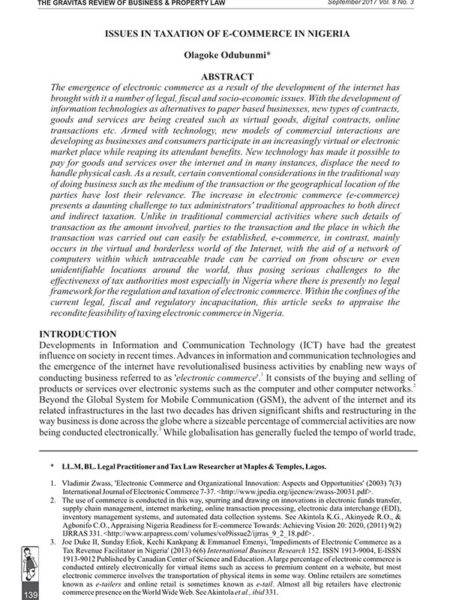
Issues in Taxation of E-Commerce in Nigeria
0₦2,500.00Olagoke Odubunmi, Legal Practitioner and Tax Law Researcher at Maples & Temples, in “Issues in Taxation of E-Commerce in Nigeria”, argues that the main difficulty that electronic commerce poses for the Nigerian tax system stems from the fact that extant national laws governing income taxation are premised on the assumptions of physical presence of parties to business transactions. With the need for physical presence removed or diminished in e-commerce, there is a problem of how to determine the right to tax profits that are derived, with same having intrinsic implications for the full realisation of income tax revenues. Within the confines of the current legal, fiscal and regulatory incapacitation, Odubunmi appraises the challenge of taxing e-commerce in Nigeria.
-
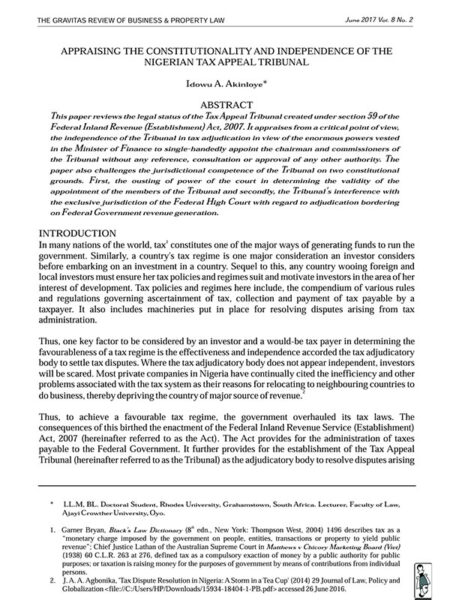
Appraising the Constitutionality and Independence of the Nigerian Tax Appeal Tribunal
0₦2,500.00Idowu Akinloye, of the Faculty of Law, Ajayi Crowther University, Oyo in “Appraising the Constitutionality and Independence of The Nigerian Tax Appeal Tribunal”, examines the jurisdictional competence of the Tax Appeal Tribunal and the constitutionality of its enabling statute, the Federal Inland Revenue Service (Establishment) Act 2007, on several grounds including the likelihood that the appointment of members by the Minister of Finance may not secure the tribunal’s independence and impartiality, ousting of the power of the court in questioning the validity of the appointment of the members offends section 4(8) of the 1999 Constitution, and adjudicating on taxation of companies offends section 251(1) of the Constitution that vests exclusive jurisdiction in such matters in the Federal High Court.
-
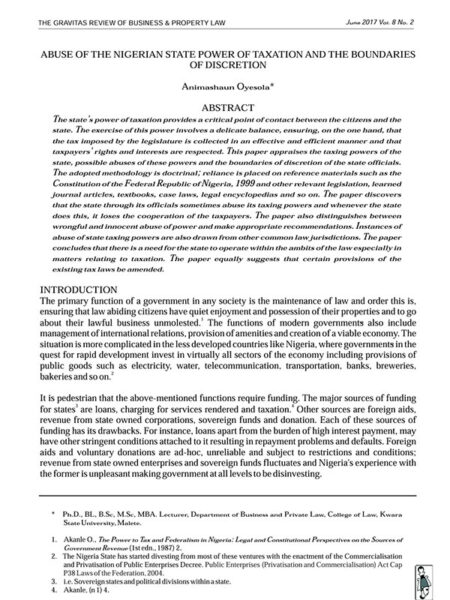
Abuse of the Nigerian State Powers of Taxation and the Boundaries of Discretion
0₦2,500.00Dr Animashaun Oyesola, of the Department of Business & Private Law, Kwara State University, Malete in his article, “Abuse of the Nigerian State Power of Taxation and the Boundaries of Discretion”, appraises the taxing powers of the Nigerian State giving examples of how the powers have been abused and distinguishing between wrongful and innocent abuse. He examines several instances of how state officials have misused their discretion and recommends how taxing statutes may be strengthened without violating the rights of the tax payer.
-
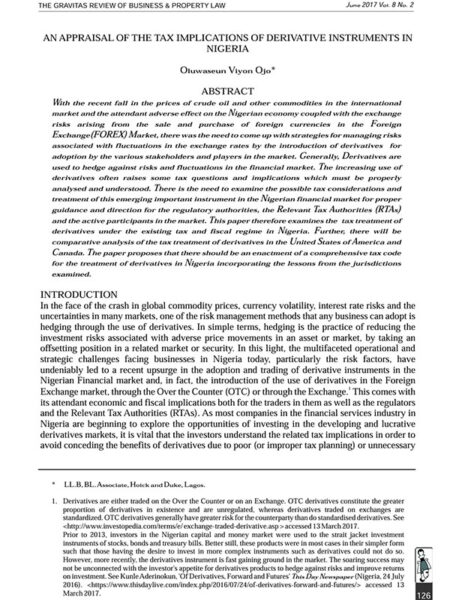
An Appraisal of the Tax Implications of Derivative Instruments in Nigeria
0₦2,500.00Oluwaseun Ojo, Associate, Hoick and Duke in his article, “An Appraisal of The Tax Implications of Derivative Instruments in Nigeria”, examines how instruments like futures, swap, options and forward contracts are used to hedge against risks and fluctuations in the financial market. He traces the use of Derivatives in Nigerian financial market and its tax treatment under the Companies Income Tax Act, the Capital Gains Tax Act and the Value Added Tax Act.
-
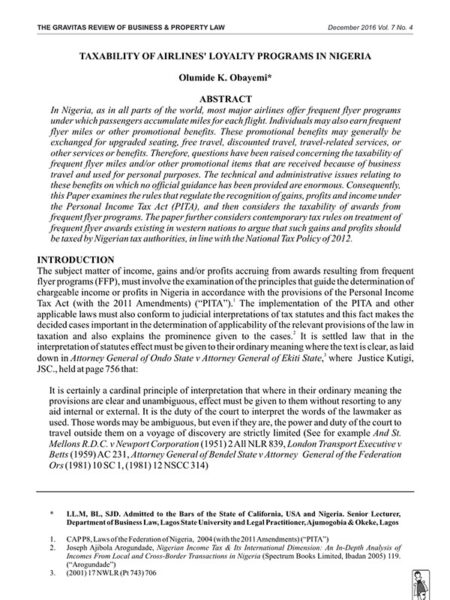
Taxability of Airlines’ Loyalty Programs in Nigeria
0₦2,500.00Dr. Olumide Obayemi, Legal Practitioner, Ajumogobia & Okeke and Senior Lecturer, Department of Business Law, Lagos State University Ojo in his article “Taxability of Airlines’ Loyalty Programs in Nigeria” examines the taxability of frequent flyer miles awards and other promotional benefits by airlines. Drawing comparison from US and Canada, he posits that airlines’ loyalty and promotional programs are “gain, profits and income” under the Personal Income Tax Act (PITA) and the beneficiaries of such programs are subject to tax on them.
-
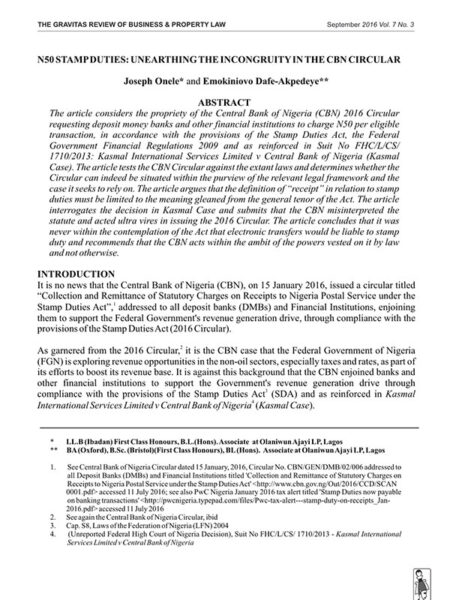
N50 Stamp Duties: Unearthing the Incongruity in the CBN Circular
0₦2,500.00Joseph Onele and Emokiniovo Dafe-Akpedeye of Olaniwun Ajayi LP, in their article “N50 Stamp Duties: Unearthing the Incongruity in the CBN Circular” examine the propriety of the Central Bank of Nigeria 2016 Circular by which Banks and other financial institutions are to charge N50 per eligible transaction. They consider the provisions of the Stamp Duties Act, the Federal Government Financial Regulations 2009 and other extant regulations, and conclude that it was never within the contemplation of the law that electronic transfers would be liable to stamp duty given that, among others, it is impracticable to issue a “receipt duly stamped”.
-
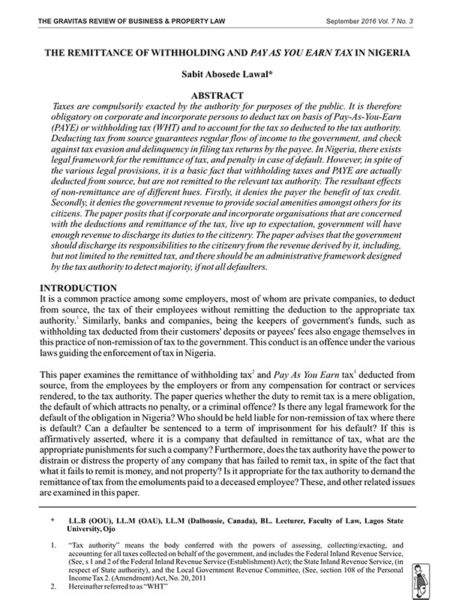
The Remittance of Withholding and Pay as You Earn Tax in Nigeria
0₦2,500.00Sabit Lawal, Lecturer, Faculty of Law, Lagos State University, Ojo, in her article “The Remittance of Withholding and Pay As You Earn Tax in Nigeria” undertakes a comprehensive review of the legal framework for remittance of WHT and PAYE tax in Nigeria. She examines issues of default and penalties for non-remittance with recommendations on how the tide of default may be stemmed.
-
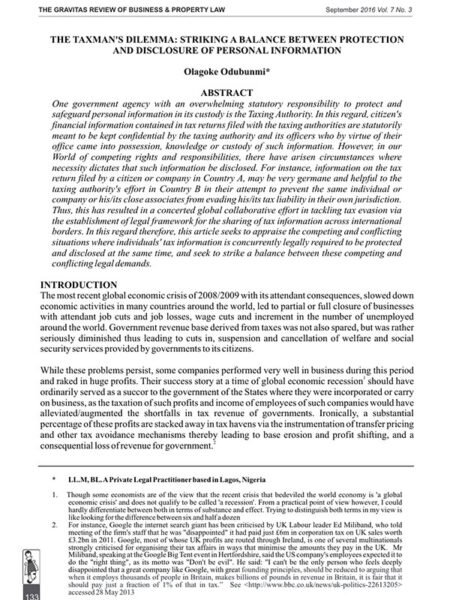
The Taxman’s Dilemma: Striking a Balance between Protection and Disclosure of Personal Information
0₦2,500.00Olagoke Odubunmi, Legal Practitioner, Lagos in “The Taxman’s Dilemma: Striking A Balance Between Protection and Disclosure of Personal Information” examines several provisions of the Companies Income Tax Act and Personal Income Tax Act on protection of personal information of a tax payer against other provisions of national legislations and international obligations mandating disclosure in an era of concerted global efforts against tax evasion, base erosion and profit shifting.
-
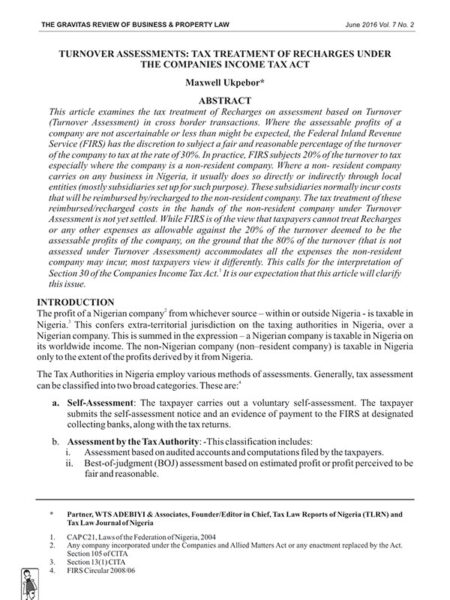
Turnover Assessments: Tax Treatment of Recharges under the Companies Income Tax Act
0₦2,500.00Maxwell Ukpebor, Partner, WTS ADEBIYI & Associates, Founder/Editor in Chief, Tax Law Reports of Nigeria (TLRN) and Tax Law Journal of Nigeria in his article “Turnover Assessments: Tax Treatment of Recharges Under the Companies Income Tax Act” examines the unsettled issue of tax treatment of Recharges on Turnover Assessment in cross border transactions. Where the assessable profits of a company are not ascertainable or less than might be expected, the Federal Inland Revenue Service (FIRS) has the discretion to subject a fair and reasonable percentage of the turnover of the company to tax at the rate of 30%. In practice, where the company is a non-resident company, FIRS subjects 20% of the turnover to tax. Costs incurred by local subsidiaries of non-resident companies are normally reimbursed by/recharged to the non-resident company. Are the costs and expenses (called Recharges) allowable or not against the 20% Turnover? While most tax payers believe they are allowable, FIRS “thinks not”. Mr. Ukpebor in this masterly exposition clarifies the issue in controversy.
-
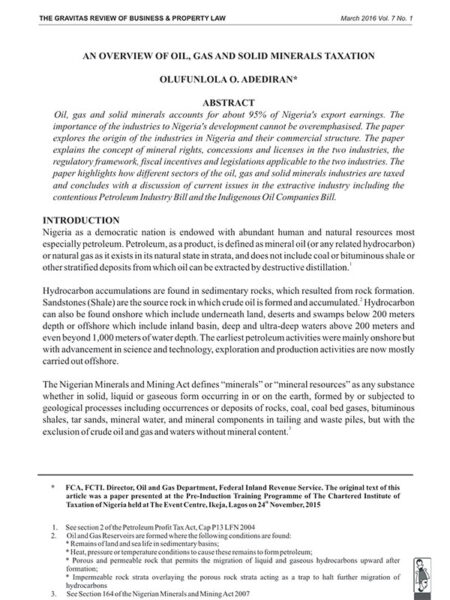
An Overview of Oil, Gas and Solid Minerals Taxation
0₦2,500.00Olufunlola Adediran, Director, Oil and Gas Department, Federal Inland Revenue Service in “An Overview of Oil, Gas and Solid Minerals Taxation” examines the commercial structure of the oil, gas and solid minerals industries. She explains the concept of mineral rights, concessions and licenses in the two industries, the regulatory framework, fiscal incentives and legislations applicable to them. She highlights how different sectors of the oil, gas and solid minerals industries are taxed and discusses current issues in the extractive industry including the contentious Petroleum Industry Bill and the Indigenous Oil Companies Bill.
-
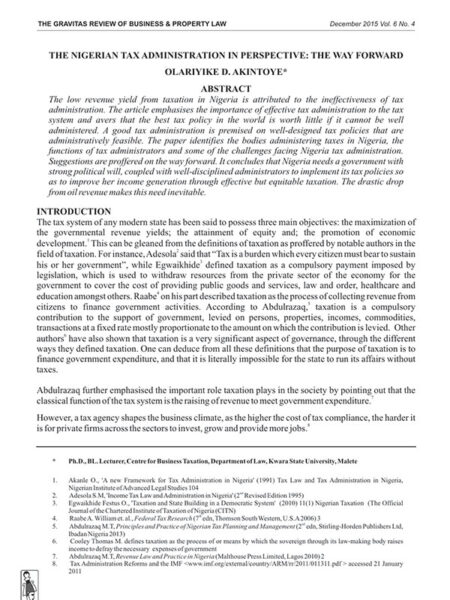
The Nigerian Tax Administration in Perspective: The Way Forward
0₦2,500.00Dr. Olariyike Akintoye of the Centre for Business Taxation, Kwara State University, Malete in “The Nigerian Tax Administration in Perspective: The Way Forward”, examines the legal framework for tax administration in Nigeria analysing the challenges and proffering ways to improve governments’ income generation through effective but equitable taxation.
-
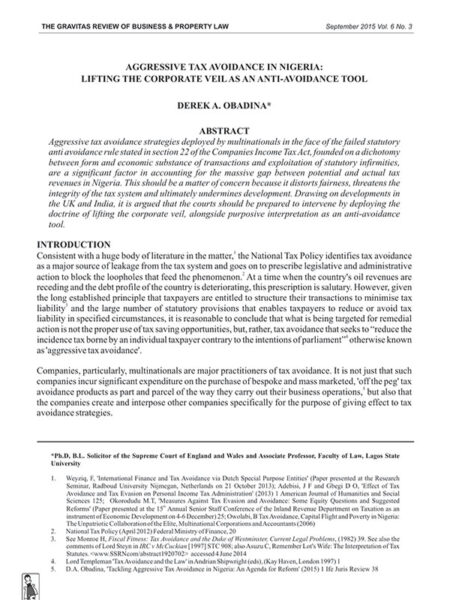
Aggressive Tax Avoidance in Nigeria: Lifting the Corporate Veil as an Anti-Avoidance Tool
0₦2,500.00Derek Obadina, Associate Professor of Taxation, Lagos State University, in his article “Aggressive Tax Avoidance in Nigeria: Lifting the Corporate Veil as an Anti-Avoidance Tool” examines tax avoidance and the deployment of corporate veil lifting as an anti-avoidance tool.
The Gravitas Review of Business & Property Law



